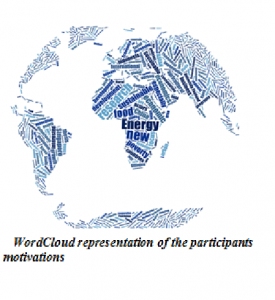 Over the last two decades, the concept of sustainable development (SD) has been widely discussed and studied within higher educational institutions. As recently as last year, the Sustainable Development Goals have been adopted by the member countries of the United Nations as the key benchmark for development framework for the next 15 years.
Over the last two decades, the concept of sustainable development (SD) has been widely discussed and studied within higher educational institutions. As recently as last year, the Sustainable Development Goals have been adopted by the member countries of the United Nations as the key benchmark for development framework for the next 15 years.
While pursuing its goals to nurture globally minded individuals with the capacity to contribute to sustainable development in Asia and throughout the world, the three departments, namely the Graduate School of Economics (GSE), Graduate School of Agriculture and Graduate School of Letters, under the aegis of the AGST project, have jointly organised a winter school with university partners in Asia and Europe.
For eight days, more than 15 nationalities hailing from different regions of the World, (Asia, Africa, Latin America, the Middle East and Europe), and from different academic backgrounds, have explored, discussed and debated over three overarching topics of SD with their counterparts at Kyoto University.
The organisational approach during the graduate seminar was divided in three parts comprising lecture series, group works and field visits to introduce various key concepts of SD. Lecture series and field visits were accompanied with some aspect of coexistence and diversity from the perspective of Japan. Activities such as the visits of a emblematic landmark like Kiomizu-dera Temple, a picturesque place representing the Japanese rurality in Ohara, and the visit to Panasonic Eco Technology Center, were part of the experience. Cultural diversity, the past and the present as well as the idea of the East and West were inspiring the multidisciplinary dialogue of the KGS 2016.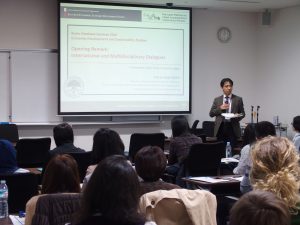
Lecture series consisted of exploring three overarching topics: agriculture and sustainable development, sustainable business and finally environmental governance. Regardless of the academic background, the design of the lectures was intended to familiarise the students to the essential concepts within the three themes mentioned earlier. Group works made it possible for all the participants to deepen their understanding of a particular issue of our modern society.
As a tradition, one session of the seminar was dedicated to young researchers who are either in an advanced stage in their PhD curriculum or recently graduated. The purpose of this session was to give useful tips on how to conduct research not only about the method, but also about the way of life as a young researcher. This was mainly intended to fill the gaps that books on research methods and methodology do not cover. Furthermore, it was an opportunity for faculty members to receive some feedback about the way to approach research supervision.
At the end of the winter school, in a warm atmosphere, the Dean of the GSE, Professor Se-il Mun, and the Director of the AGST project, Professor Shuji Hisano honoured with their presence the certificate ceremony. Dean Mun’s message emphasised on the willingness of the University to strengthen co-operation with its partners and to support efforts in this direction. In his concluding remarks, the Director of the AGST, also insisted on the importance of cultivating Multidisciplinary approach and the creation of global citizenship to approach SD problems. The impressions of the students were also very positive about the things they shared and learnt during the seminar week.
Participating Institutions (number of students):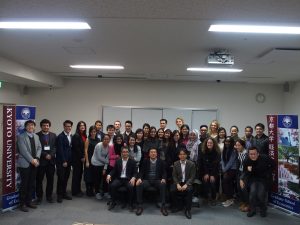
Chang Mai University, Thailand (1); Erasmus University Rotterdam, the Netherlands (1); The University of Göttingen, Germany (3); Gadjah Mada University, Indonesia (4); Kyoto University, Japan (5); Kyungpook National University, South Korea (2); Renmin University, China (2); Singapore Management University, Singapore (2); Thammasat University, Thailand (11); Wageningen University, the Netherlands (3).
Nationalities represented during the 2016 KGS
China (4); France (4); Germany (1); Indonesia (6); Iran (1); Japan (1); Kenya (1); Korea (2); Mexico (1); the Netherlands (3); Phillipines (3); Singapore (2); Thailand (6); Vietnam (2).
Seminar highlights
【Sustainable Development Studies in the Context of Socioeconomic and Political Transition in the Mekong Region】
By professor Chayan Vaddhanaphuti, Director of the Regional Centre for Social Science and Sustainable Development, Faculty of Social Sciences, Chiang Mai University, Thailand.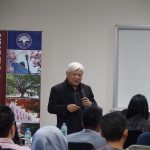
In a complex world, what matters in development studies is a critical understanding of the discipline. That is to say: demystifying important issues such as social inequality, environmental degradation, neoliberalism, etc. Furthermore, the concept of development has never been apolitical in this sense, nurturing the political of depoliticisation of development should give an insight to future research.
【Sustainable agri-food development, tackling social justice in the community】
By Professor Keiko Tanaka from the Department of Community & Leadership Development of the University of Kentucky.
Drawing from the case of the United States, professor Tanaka asked What do we want the agro-food system to be? How to create a just agro-food system? 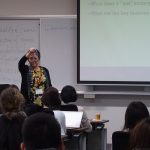
Think globally, act locally: we must be cognisant that food unites people while dividing people. We need to ask whose agro-food system we want to change: what is “good” is not necessarily what others see as “good” and “desirable”. We need to be willing to learn from people across the world, as they carry diverse ways of thinking and acting.
Embrace imperfect politics, dream big for the future: Politics is messy and time consuming. Food is an entry point to do politics because everyone can talk and care about food. Once we accept diverse economies are possible, then we can build a new, innovative process like the case of Fresh Stop Markets in Kentucky that enables us to re-imagine our agro-food system.
【Climate politics in the Philippines and Beyond】
Professor Walden Bello is currently visiting senior research scholar at the Centre for Southeast Asian Studies of Kyoto University, an associate of the Amsterdam-based Transnational Institute, and a professor at the Department of Sociology of the State University of New York at Binghamton.
Professor Bello use the case of the Philippines in the Climate negotiation share is point of view about the Climate deal agreed in Paris.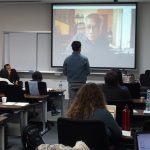
There are few that really think the Paris Climate Deal is a good deal. The question is: Is a bad deal better than no deal at all? Would it not be better to force the parties back to the negotiating table rather than have the world be subjected to the illusion that we have an agreement that addresses the Climate crisis with the seriousness it deserves?



